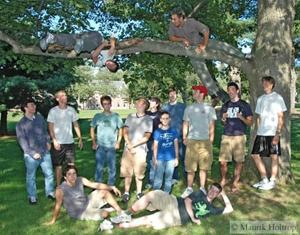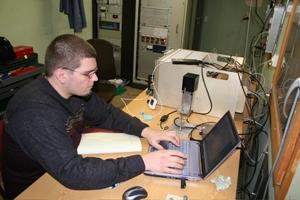Why come to the UNH Physics Department?
-
We are a small department of about 20 faculty, 60 undergraduates and 60 graduate students.

- Being a small department, your upper division courses (second year and beyond) will typically have 20 or fewer students.
- There are many opportunities for undergraduates to do research at UNH. Students have begun research as early as their freshman year here.
- We offer interdisciplinary options in material science, chemical physics, and astronomy.
- We offer an innovative first year course that teaches calculus and physics together. In this class, many of the activities involve group work and hands-on work.
- We have an active chapter of the Society of Physics Students which does service activities and enrichment activities.
Why study Physics?

We hear from our alumni that their physics education has helped them in their careers by giving them experience with large, complex, technical problems.
Some of the jobs held by our B.S. and B.A. majors include the following:
- Teaching Physics at high school level
- Working at Lincoln Labs in Boston to help study wind shear to make airplanes safer
- Working at COLOR in Portsmouth to design lasers for the big screens in sports stadiums
-
Working at Goddard Space Flight Center in Maryland to help analyze the data from the Hubble Space Telescope
-
Working as a rocket scientist at a UNH lab.
Employment after graduation is always a concern for students and their parents. The following links are to the national physics professional associations. These associations provide information on physics careers.
American Association of Physics Teachers
Many students choose physics as a major because "it is cool!" Here are some cool physics websites:
Images from the Galileo spacecraft
Physics in real-time on the web
What comes after getting a physics degree?
The American Institute of Physics (AIP) is collecting statistical data on education and employment in physics and related fields.
Who Is Hiring Physics Bachelor’s?
A searchable state-by-state listing of many employers who recently hired physics bachelor’s into science and engineering positions.
Latest Employment Data for Physicists.
Reports that provide the latest data on where physicists work and what they do throughout the economy and at different degree levels.
The American Institute of Physics
AIP's Statistical Research Center home page.
For more information or to plan a visit, please contact any one of the following people: